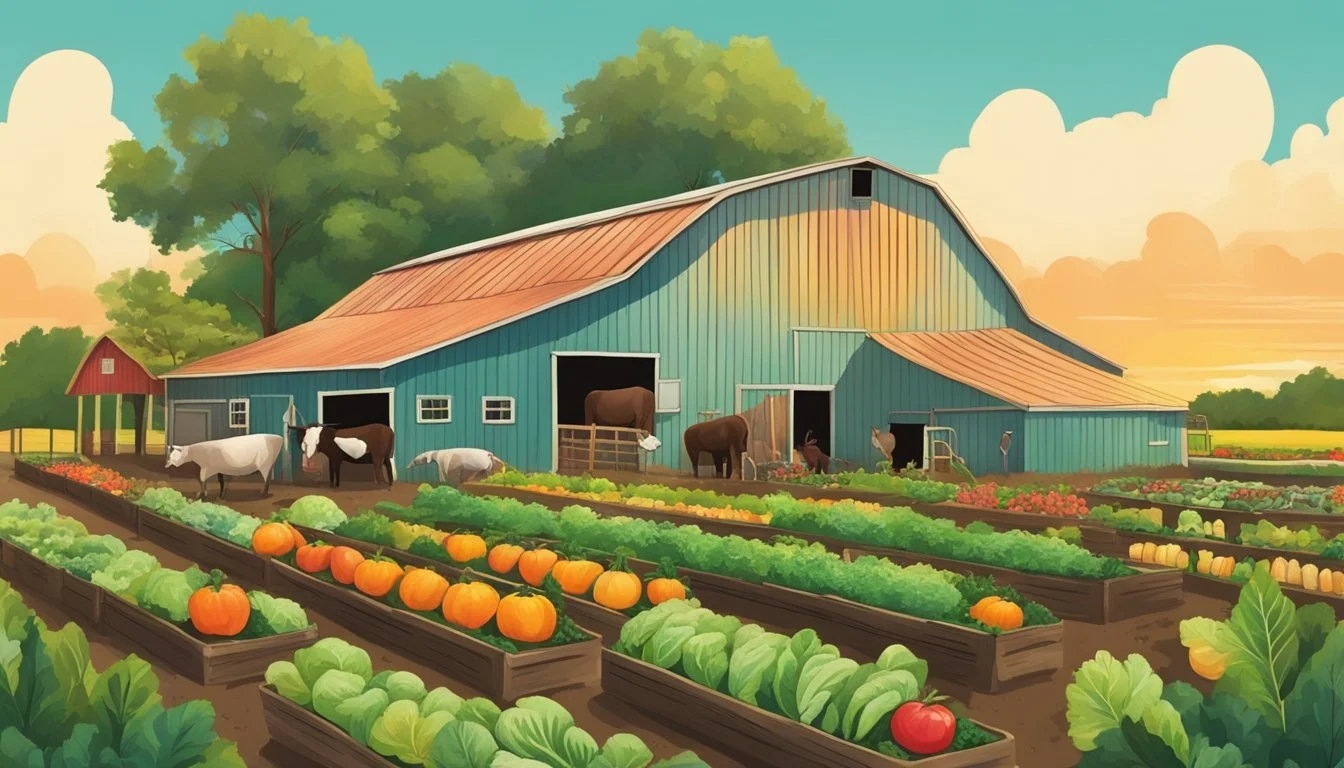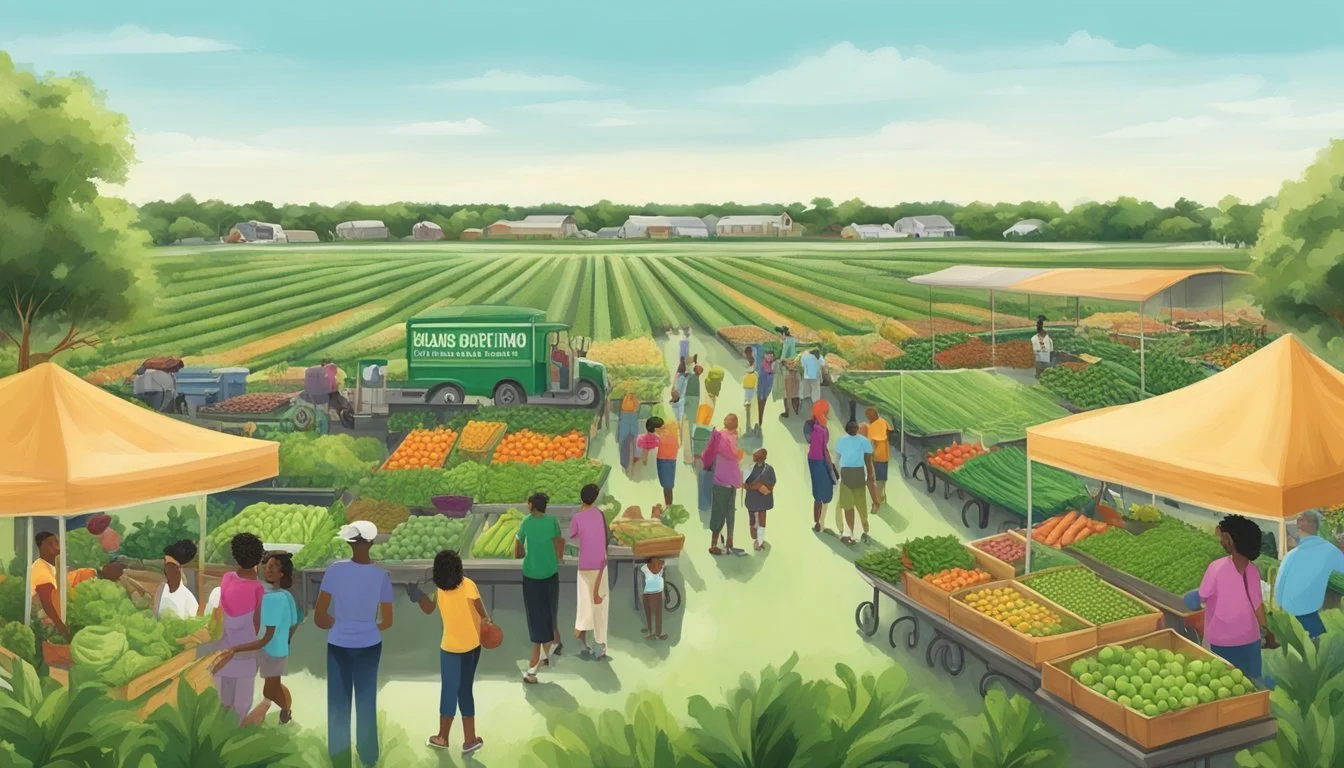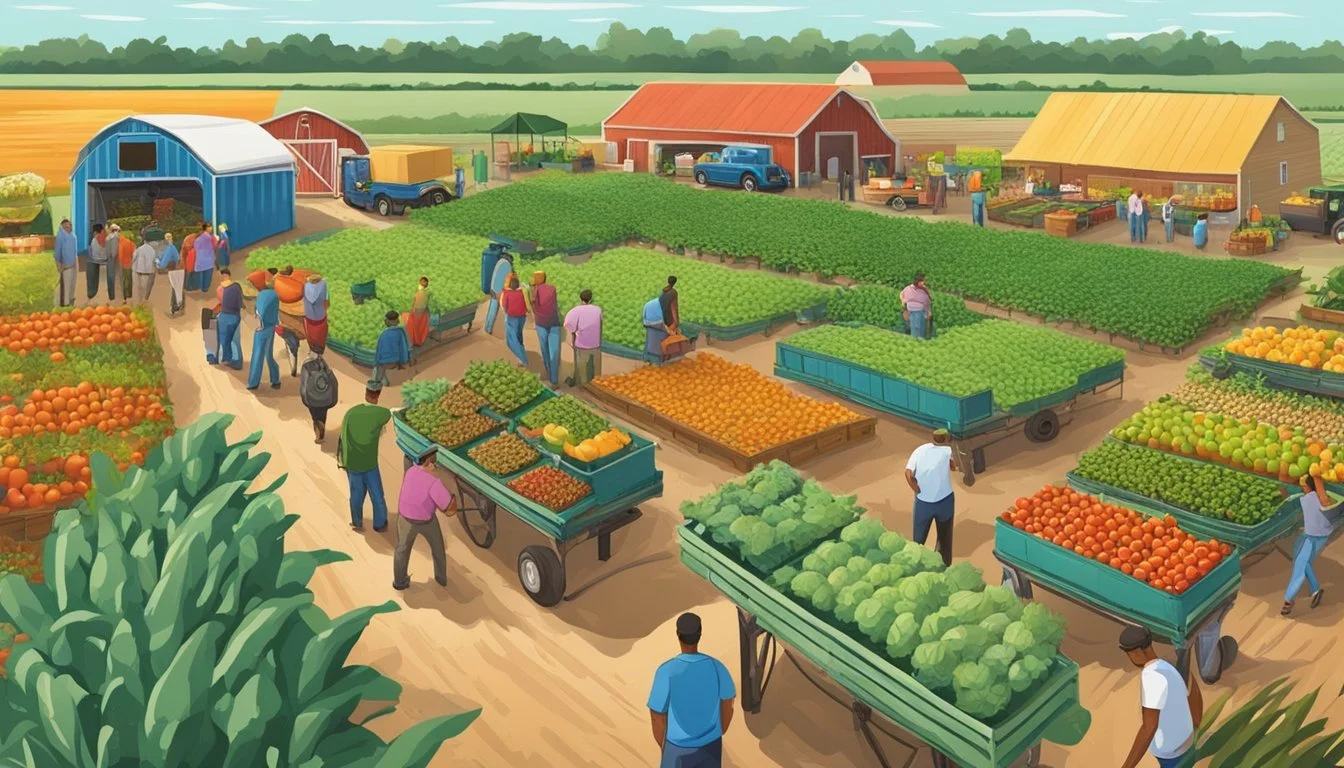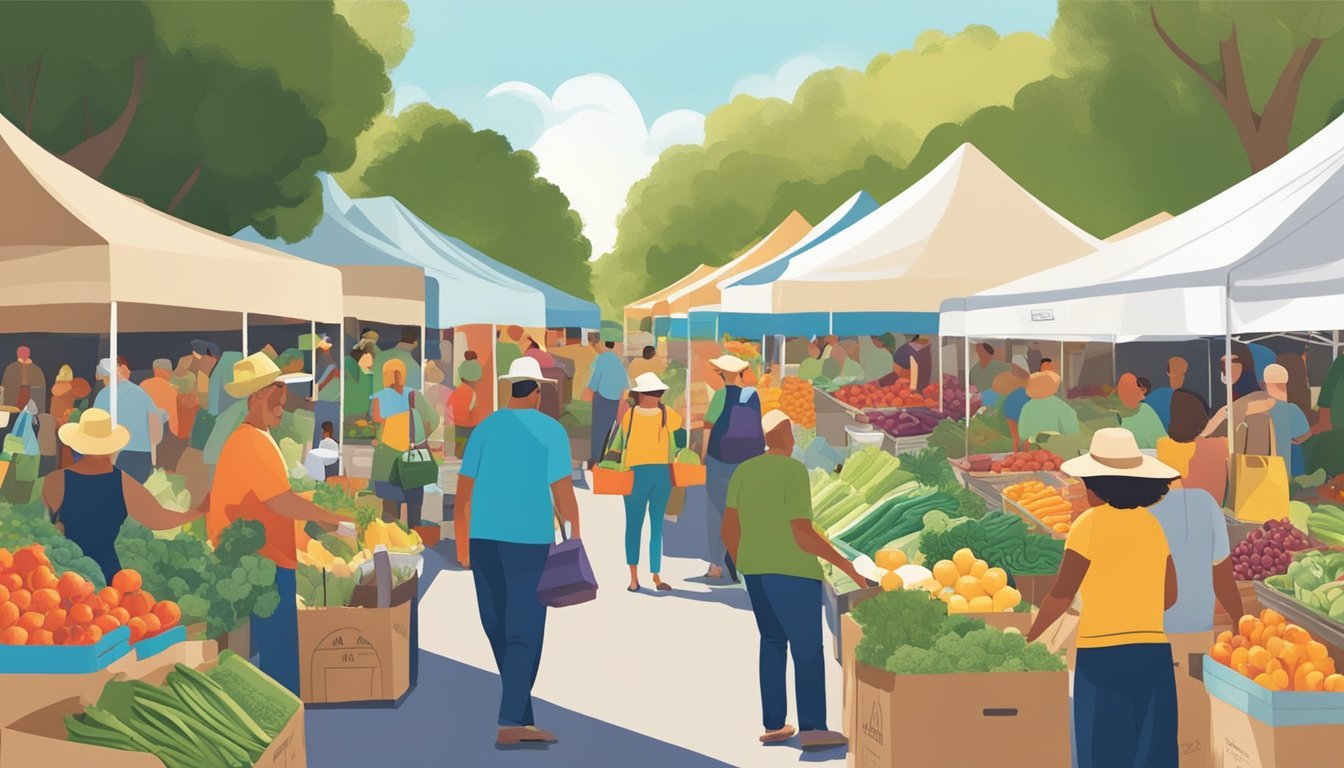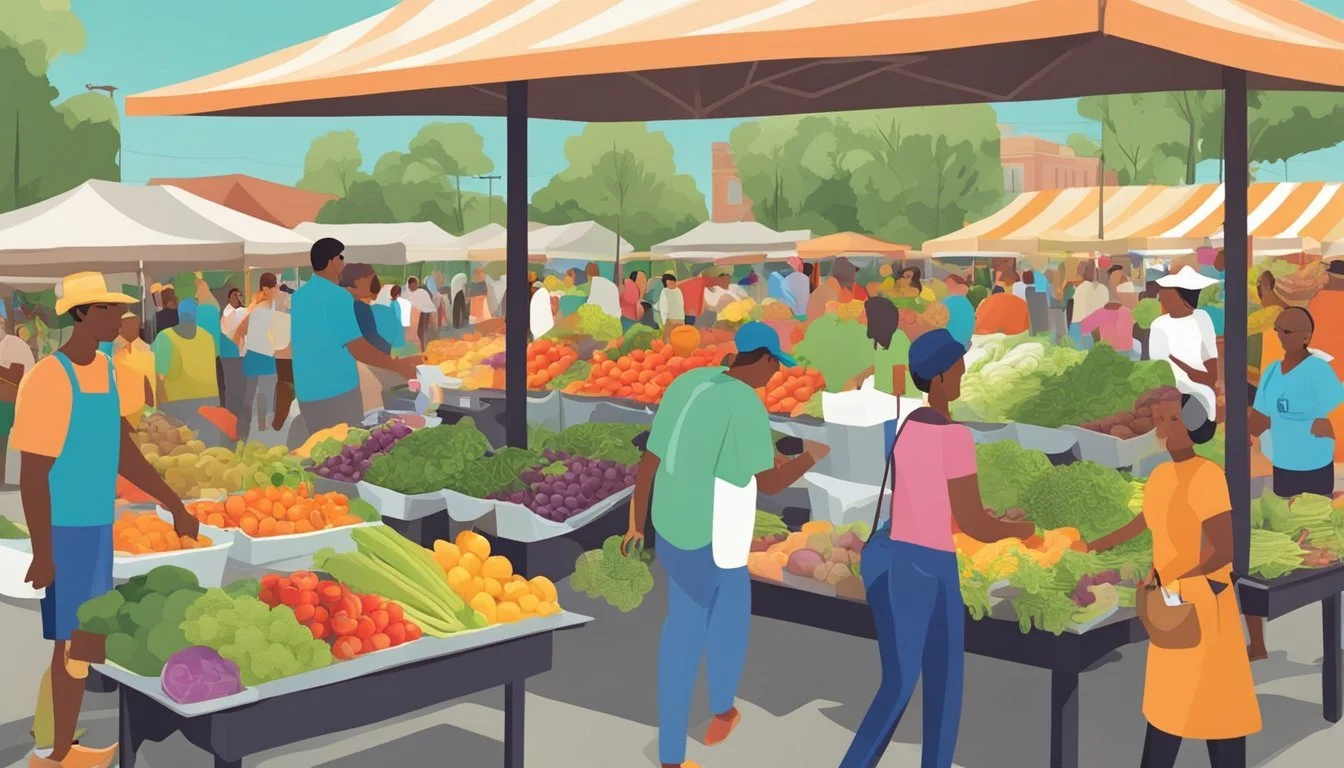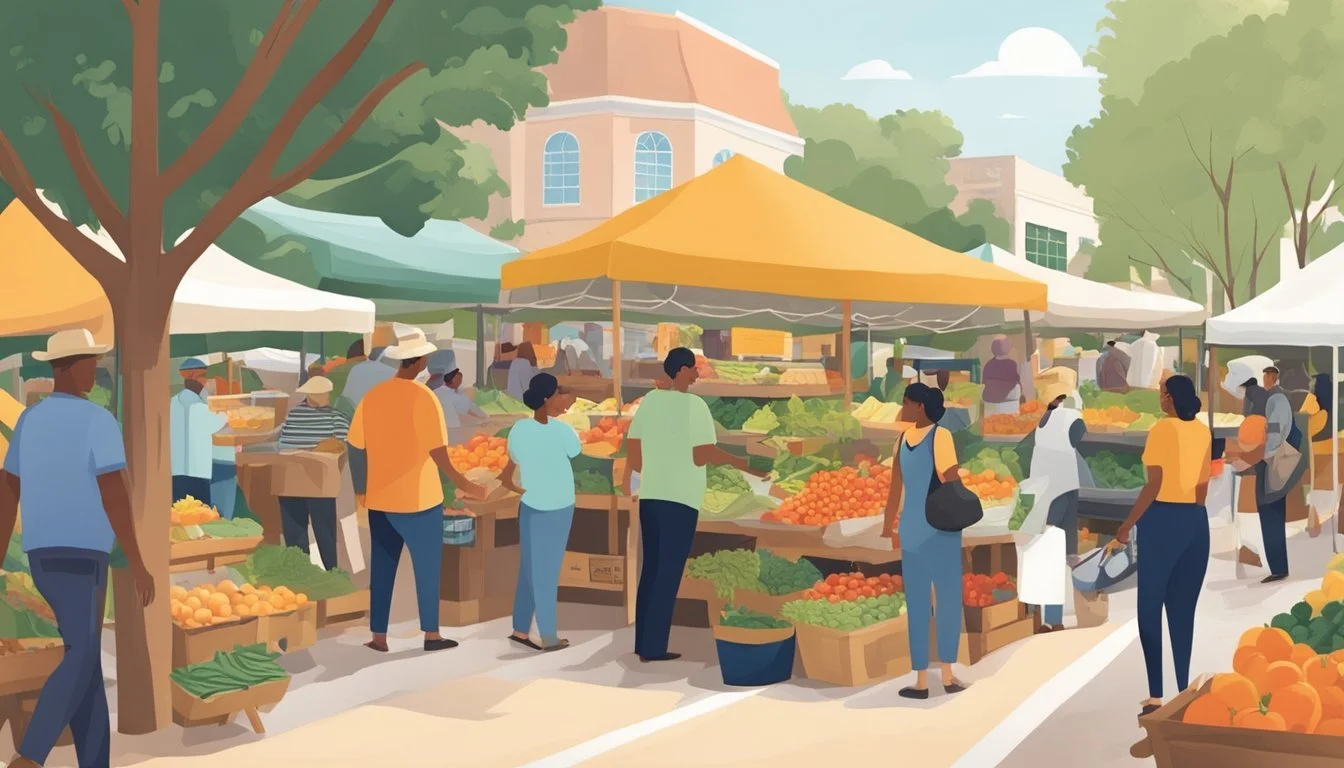Community Supported Agriculture (CSA) in Tampa, FL
A Guide to Local Produce and Farms
Community Supported Agriculture, commonly known as CSA, is an innovative food distribution model that has taken root in Tampa, Florida. This system allows residents to have direct access to high-quality, fresh produce grown by local farmers. By purchasing CSA memberships, individuals in Tampa can receive seasonal produce directly from farms, creating a close-knit relationship between the consumers and the producers of their food. This not only supports the local economy but also promotes sustainable, organic farming practices.
In Tampa, farms like Black Finger Farm and Sweetwater Organic Community Farm have embraced the CSA model, providing an array of organic produce to their members. Black Finger Farm, located in Lutz, FL, has been operational since 2016 and focuses on bio-intensive, organic farming practices. Sweetwater Organic Community Farm, established in 1995, stands as an urban organic farm and environmental education center. Situated on suburban property along Sweetwater Creek, it brings an agricultural presence to the neighborhood of Town 'n' Country in southern Tampa.
These farms reflect the commitment of the Tampa community to embrace organic, locally sourced food. They offer CSA memberships, allowing community members to subscribe to a share of the season's harvest. Such partnerships ensure that people have a stake in the success of their local farms and that farmers can receive upfront support for their crops. Tampa's participation in Community Supported Agriculture signifies a shift towards a more sustainable and health-conscious lifestyle within the community.
Understanding CSA
Community Supported Agriculture, or CSA, is an innovative food distribution model that connects consumers directly with local farms. This section delves into the key aspects of CSAs, the reciprocal benefits for consumers and farmers, and the variety of membership models available.
CSA Fundamentals
Community Supported Agriculture (CSA) represents a system where individuals pledge support to a farm operation, allowing the farmer to plan for a stable financial future. CSA members buy shares of the farm's harvest in advance, which is a fundamental economic linkage based on shared risk and reward between the farmer and the community.
Seasonal: Members typically receive a portion of the farm’s produce throughout the growing season.
Subscription-based: The CSA operates as a form of subscription where the consumer commits to a season’s worth of produce.
Variety of produce: Shares often include a variety of fruits and vegetables, but may also feature other farm products.
Benefits for Consumers and Farmers
CSAs offer multiple benefits for both consumers and farmers, fortifying a mutually beneficial relationship. Consumers gain access to fresh, seasonal, and organic produce directly from the source, often at a better price point due to the direct relationship. They also enjoy a connection to the land and understanding of where their food comes from.
For farmers, CSAs provide financial security with upfront payments, allowing for better planning and resource allocation. They foster a direct relationship with consumers, which can lead to a loyal customer base and valuable feedback about their produce.
Direct connection: Consumers foster a closer relationship with the source of their food, and farmers receive direct market access.
Shared risk: The CSA model involves a degree of shared risk, as members are typically aware that farm outputs can vary with conditions.
CSA Membership Models
CSA membership models can vary, giving consumers flexibility in how they participate. Here are common models:
Traditional Model: Members pay upfront for a season and receive a predetermined share of the harvest weekly or bi-weekly.
Market-Style Model: Members have some choice in the produce they receive, selecting items from a designated distribution point.
Debit System: Members pay upfront but can choose when and what they take, up to a certain dollar amount.
No matter the model, CSA memberships are foundational in establishing a community-supported system that promotes sustainability and local economies. They empower consumers to become a vital part of their food system through a subscription to a season's harvest.
Local Impact of CSA
Community Supported Agriculture (CSA) plays a crucial role in supporting Tampa's local agriculture and economy while promoting sustainable practices. This section explores its specific impacts on the area.
Supporting Tampa's Farmers
CSAs directly benefit Tampa's farmers by providing an upfront source of income through membership fees empowering them to focus on sustainable farming practices. Local farms like Black Finger Farm thrive on the commitment from the community, ensuring a market for their organic produce.
Strengthening the Local Economy
When members invest in a Tampa Bay area CSA, they are bolstering the local economy by keeping funds within the community. This supports not just the farmers, but also encourages the proliferation of related businesses, such as local seed suppliers and food markets.
Environmental Benefits
Through CSA, Tampa benefits from environmental education and sustainable agriculture practices. Sweetwater Organic Farm, for example, is not only a CSA but also an environmental education center that teaches about organic farming and sustainability. These farms often use less water and avoid harmful pesticides, contributing to the health of Tampa's ecosystem.
By understanding these specific impacts, it becomes clear how vital CSA is to the Tampa region, providing benefits that extend well beyond just the provision of fresh, local food.
Tampa's CSA Farms
Community-supported agriculture (CSA) is thriving in Tampa, FL, with urban, suburban, and rural farms contributing to a vibrant local food system. These farms offer fresh, locally grown produce directly to consumers, embracing sustainable agriculture techniques.
Sweetwater Organic Community Farm
Sweetwater Organic Community Farm, a nonprofit CSA established in 1995, operates on several acres along Sweetwater Creek in Tampa's Town 'n' Country neighborhood. It is known for pioneering urban organic farming in Tampa Bay and provides a variety of vegetables to its community members. The farm also doubles as an environmental education center.
Urban Organic Farms
Within the bustling city limits of Tampa, urban organic farms have carved out green spaces where farmers grow a diverse array of vegetables. These farms offer residents the chance to engage directly with their food source, providing CSA memberships to support the farm's operations while receiving a share of the harvest.
Suburban and Rural Farms
Surrounding Tampa, numerous suburban and rural farms contribute to the CSA model, offering fresh produce to the Tampa FL area. They utilize suburban properties and outlying lands to implement sustainable agriculture techniques—ensuring a steady supply of organic vegetables for their CSA members within the Tampa Bay region.
CSA Products and Offerings
Community Supported Agriculture (CSA) in Tampa, FL offers a bounty of fresh, organic produce and locally sourced animal products. These offerings hinge on seasonal availability and connects consumers directly with the source of their food.
Seasonal Vegetables and Fruits
Tampa's CSA programs provide a variety of vegetables and fruits that align with the region's growing seasons. In the warmer months, customers can expect a selection of tomatoes, cucumbers, and peppers. The cooler seasons might include leafy greens like kale and spinach, along with root vegetables such as carrots and beets. Fruit selections are equally diverse, featuring citrus fruits, berries, and stone fruits as they come into season.
Season Fruit Offerings Vegetable Offerings Spring/Summer Berries, Citrus Fruits, Stone Fruits Tomatoes, Cucumbers, Peppers Fall/Winter Citrus Fruits Kale, Spinach, Root Vegetables
Herbs and Specialty Products
In addition to foundational produce, CSAs may also provide a range of herbs and specialty products. This includes but is not limited to basil, cilantro, and mint, which enhance the flavors of any meal. Some farms extend their offerings to include organic, locally produced honey, jams, and preserves, delivering the unique tastes of the region right to the table.
Herbs Specialty Products Basil Local Honey Cilantro Jams and Preserves Mint
Meat, Eggs, and Dairy
For consumers looking for animal products, CSAs in Tampa often feature meats from pasture-raised chickens and hens, and eggs that are fresh from the farm. A handful of CSAs may even offer dairy products, including fresh milk and a variety of cheeses. These offerings underscore Tampa's commitment to sustainable practices and animal welfare.
Animal Products Notes Meat Pasture-Raised Eggs Fresh from the Farm Dairy Including Local Cheeses
Building Community with CSA
Community Supported Agriculture (CSA) in Tampa, FL, plays a pivotal role in fostering a sense of unity by integrating educational programs, volunteer opportunities, and community events into the fabric of local agriculture.
Educational Programs
CSA programs in Tampa offer a variety of educational initiatives designed to promote appropriate land stewardship and sustainable farming practices. Sweetwater Organic Farm, for instance, functions not only as an urban organic farm but also as an education center. They provide educational field trip programs that give participants hands-on experience in organic farming, thereby reinforcing the connection between the food they eat and the source from which it comes.
Volunteer Opportunities
Volunteer involvement is essential to the operation and spirit of CSAs. Community members can contribute through farming activities, assisting in the delivery of produce to CSA members, and helping during seasonal events. Through volunteer efforts, individuals gain valuable farming knowledge, which can lead to increased awareness and support for sustainable agriculture practices within Tampa's community.
Community Events
CSAs often host community events to strengthen the connection between the farm and the community. Events can include a music series, outdoor movies, and other seasonal celebrations. For example, Sweetwater Organic Farm has received a grant to improve its infrastructure, which indirectly contributes to Tampa Bay's well-being by addressing stormwater pollution. These events provide an opportunity for community engagement and education beyond the realm of agriculture, fostering a sense of belonging and shared responsibility toward the environment and each other.
Marketing and Selling CSA Shares
In Tampa, FL, the success of a Community Supported Agriculture (CSA) program hinges on effective marketing strategies and streamlined selling processes to attract and retain members.
Understanding the CSA Market
The CSA market in Tampa is characterized by a community of consumers eager to support local agriculture and receive fresh farm products. Growers market shares of their harvest through subscriptions where consumers, becoming CSA members, pay in advance for a season's worth of produce. This model benefits both members, who get fresh, local produce, and farmers, who gain a more predictable income stream.
Promotion and Outreach
Growers must actively promote their CSA shares to reach potential members in Tampa's vibrant markets. Effective strategies include leveraging social media platforms, engaging in local farmers markets, and participating in events aligned with healthy lifestyle and sustainability. This exposure increases visibility and educates consumers on the benefits of joining a CSA program.
Utilizing Digital Marketing:
Social Media: Regular updates with vibrant images of farm products and CSA boxes.
Email Campaigns: Newsletters with harvest updates, recipes, and special promotions.
Community Engagement:
Farmers Markets: Set up a booth to showcase products and offer sign-up opportunities.
Events and Workshops: Educate the public on CSAs through workshops.
Subscription and Payment Methods
CSAs in Tampa offer various subscription models and payment methods to cater to different member needs. Payment flexibility can range from one lump sum to installment payments, making it accessible for more consumers to participate. Additionally, they utilize software to manage subscriptions, billing, and communications, ensuring a smooth process for both members and growers.
Subscription Options:
Seasonal Shares: A predetermined number of weeks with consistent deliveries.
Flexible Shares: Pick and choose delivery weeks based on availability or member preferences.
Payment Methods:
Online Payments: Safe and convenient options using software like CSAware.
In-Person Payments: Collect payments during market days or farm visits.
Handling transactions effectively and offering diverse payment options cater to a broader audience and make joining a CSA program more appealing. By following these practices, Tampa's CSA growers can maintain robust sales and a dedicated membership base.
Events and Farmers' Markets
Tampa, FL, showcases a vibrant community-supported agriculture scene, with local farmers' markets playing a pivotal role in connecting Tampa Bay residents to fresh, organic produce. These markets serve as a hub for both community engagement and sustainable shopping.
Sweetwater Sunday Farmers' Market
Sweetwater Organic Community Farm hosts the Sweetwater Sunday Farmers' Market each week. As a nonprofit organization, it not only provides a space for consumers to purchase fresh produce but also serves as an environmental education center. Tampa's community members can enjoy a variety of organic products directly from the farm every Sunday, where the atmosphere is lively, and the produce is always fresh.
Location: Sweetwater Organic Community Farm, Tampa, FL
Hours: Sundays from noon to 4 pm
Offerings: Organic fruits and vegetables, local honey, artisan crafts
Seasonal and Special Markets
Aside from weekly events, Tampa also benefits from a range of seasonal and special farmers' markets that crop up throughout the year. These markets may vary by location and timing but often provide special offerings aligned with holidays and seasonal produce.
Meachum Urban Farm Market: Offers a unique variety of more than 35 fruits and vegetables.
Local Special Events: Often organized around festivals and holidays, featuring seasonal goods and exclusive items.
Each of these markets gives Tampa Bay residents access to locally-sourced, fresh organic food and a chance to support area farmers and artisans. These farmers' markets are an essential facet of Tampa's local food ecosystem and demonstrate a growing investment in sustainable agriculture and community wellness.
CSA Management and Operations
Community Supported Agriculture (CSA) in Tampa, FL, integrates community involvement with sustainable agriculture. Operations are designed to forge a closer bond between consumers and their food sources while adhering to ethical farming practices.
Farm Tours and Field Trip Programs
CSA management in Tampa often includes Farm Tours and Field Trip Programs to educate members and the public. These programs are crafted to showcase the daily operations of organic farming, offering a hands-on experience with natural food production. Sweetwater Organic Community Farm, for instance, provides opportunities for visitors to witness sustainable agriculture firsthand through guided tours of their facility.
Logistics and Member Coordination
Efficient Logistics and Member Coordination are vital for the success of a CSA. Taking Black Finger Farm as an example, coordination involves setting up and managing memberships and ensuring the timely distribution of organic vegetables to its members. This process often includes online platforms to manage subscriptions and communication tools to inform members of pick-up schedules or any changes in delivery.
Membership Management:
Online subscriptions
Delivery schedules
Communication:
Email updates
Social media announcements
Sustainable Farming Practices
CSAs in Tampa embrace Sustainable Farming Practices to grow organic produce without the use of synthetic pesticides or herbicides. Their commitment to sustainability extends to the preservation of soil health and the careful management of water resources. Methods such as crop rotation, green manures, and bio-intensive land use are common, ensuring that the community receives the highest quality, environmentally-friendly food.
Key Practices:
Crop rotation
Use of green manures
Bio-intensive Land Use:
Efficient space utilization
Intensive planting methods

